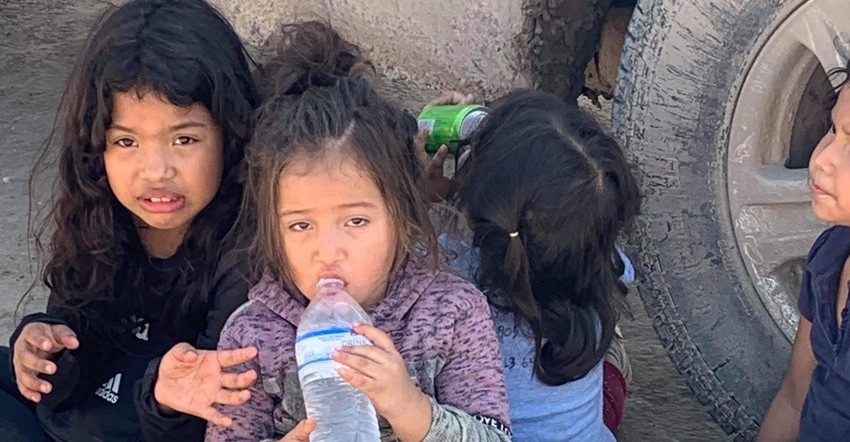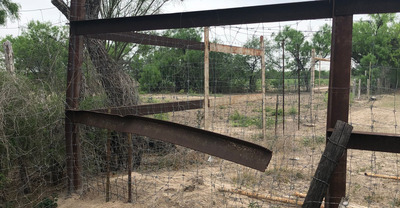
As the border situation continues to grab headlines and even a recent visit from Vice President Kamala Harris, those farmers and ranchers along the border are seeing the situation getting worse every day.
The new reality for many farmers in Southern states are “bailouts,” where smugglers driving vehicles crowded with immigrants entering the U.S. illegally are in a police pursuit. As everyone bails out of the vehicle, the smugglers crash through fences, dump clothes and backpacks, and leave children to fend for themselves.
“There is a crisis going on along the border, not just the Texas border. Unless you have been here and live here, you have no idea how bad it is. No idea until you live it,” says Stephanie Crisp-Canales.
Crisp-Canales was born and raised in LaSalle County, Texas, about 56 miles from the Mexican border. When she was a child growing up on the family ranch, many immigrants crossed the border illegally, looking for a better life.
“They didn’t steal. They didn’t try to break into your house. They came to the door, rang the doorbell and just wanted something to eat. Most of them offered to do something in return for food and wanted to do something to repay the kindness you showed them,” Crisp-Canales shares.
When she was 14 or 15 years old, she had her first experience of those trying to do harm against her. “At that point I started to see a change, and it no longer became as safe to go outside,” she recalls.
“It has slowly gotten worse and worse and worse until where we are today. We have multiple bailouts a day,” she explains.
The American Farm Bureau Federation joined all 50 state Farm Bureaus and Puerto Rico Farm Bureau in sending a letter in early June urging the Biden administration to address the surge of undocumented immigrants entering the United States. The letter points out that local and state border security resources have been exhausted, leaving little help for farmers and ranchers. It highlights the problem of human smugglers, known as Coyotes, explaining that landowners live in fear while Coyotes reap a windfall from leaving people destitute.
“Human smugglers (Coyotes) are making false promises and doing whatever it takes to get paid and get away, including jeopardizing lives and property,” the letter continues. “In their desperation to evade law enforcement, Coyotes abandon people, steal vehicles, vandalize property and threaten the safety and livelihoods of farmers and ranchers. They are often criminals who smuggle drugs and firearms into the country, frequently leaving them on farmers’ and ranchers’ property, causing unrest for farm and ranch families.”
Crisp-Canales explains previously when a bailout occurred on your property, the landowner could claim that vehicle. The salvaged vehicle could then be used to pay for repair costs and offset the costs from the bailouts of the coyote drivers who unload immigrants across the terrain if there’s a threat of being caught. Now the laws require the vehicle to be sold at auction and the landowner isn’t compensated at all.
“We have to pay to fix our fences and replace gates when it’s happening multiple times per day. It is costly. It sucks. It’s just awful,” she laments.
Fellow Texas rancher Dale Smith shares the current scenario is “dramatically different than what we’ve seen in the past.” Previously, he would see families or people who were friendly. Now it is individuals with camouflaged backpacks cutting fences and people on the highway carrying firearms and drugs along with a dozen people crammed into a vehicle.
Texas rancher Brian King says over the last six years he went from having just two bailout incidents on his farm to a now weekly occurrence over the last four months.

Bill Martin, who farms in Dimmit County, Texas, has been ranching all his life. “This is just about the worse I’ve ever seen traffic coming in across the border,” he states. Prior to this year he went two years without seeing a single illegal. Now he’s picking up 50 pounds of leftover backpacks and clothes just dumped on his property for those who don’t need it for the next stage.
He recently found the water line left running. “If I hadn’t found it, it would cost me $1,500 and the cattle wouldn’t have had water.”
Marcus Canales of LaSalle County says everybody knows South Texas has always had its issues with those crossing the border. But the surge coming in continues to create headaches. In his location near Interstate 35, one of his biggest fears is if a bailout opens up a fence and a cow gets out on the interstate, he can get sued.
Jim Chilton is a fifth-generation Arizona rancher and has land with 14 miles exposed to the Mexico border. When he started farming at the location west of Tucson in 1987, there was no real issue at the border. In the mid-1990s to 2008, waves of people were coming in and mainly headed to California, Illinois and the coasts to work until the recession hit and the traffic stopped.
After that, Chilton says the drug cartels took over all the truck trails on his ranch, and he believed the traffic changed to drug packers. The drug packers and cartel now use people who do want to seek asylum as decoys and once border control’s attention is diverted to those individuals, the cartel knows they can run the drugs up without fear of apprehension.
“We need to secure the border because the people coming across our ranch aren’t asylum seekers; these are bad guys,” Chilton shares.
For more stories on the border impact on farmers, visit https://texasfarmbureau.org/border-crisis-impacts.
About the Author(s)
You May Also Like






